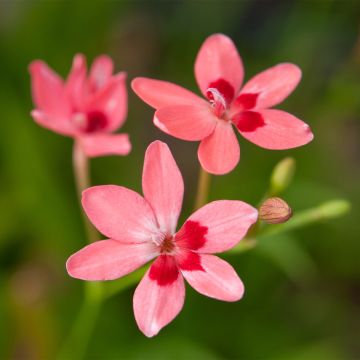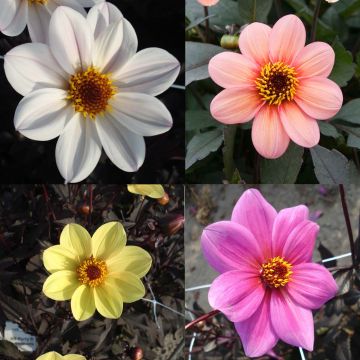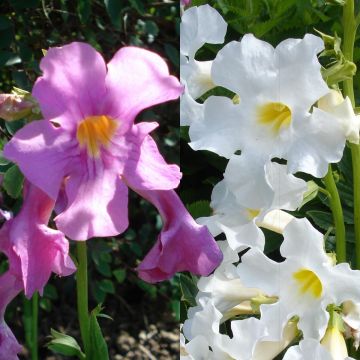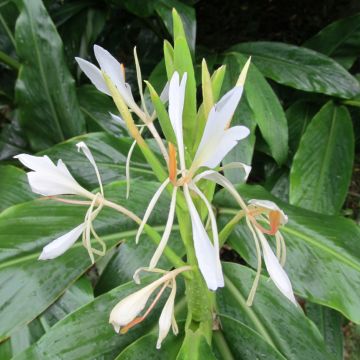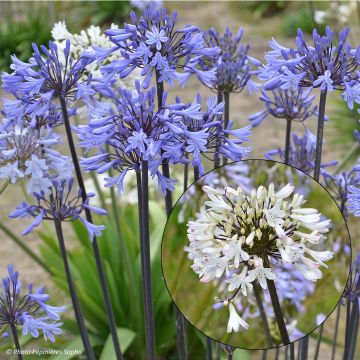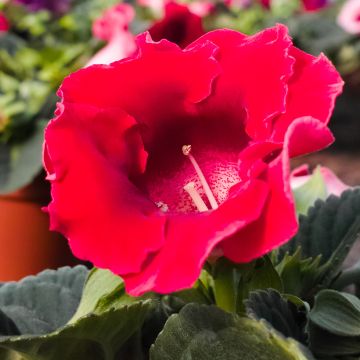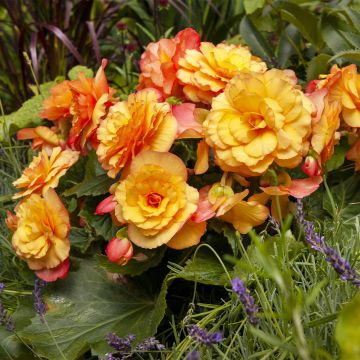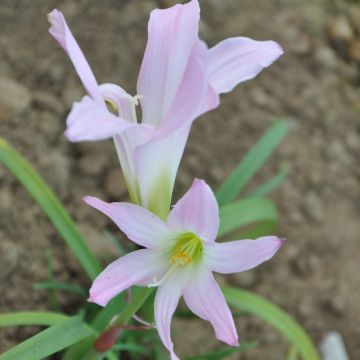

Ornithogalum Arabicum


Ornithogalum Arabicum
Ornithogalum arabicum
Ornithogalum arabicum
Star of Bethlehem, Arabian Star Flower
The bulbs were beautiful But none of them sprouted. I left them in place. So perhaps they will wake up this spring?
Brifau, 30/11/2025
Special offer!
Receive a €20 voucher for any order over €90 (excluding delivery costs, credit notes, and plastic-free options)!
1- Add your favorite plants to your cart.
2- Once you have reached €90, confirm your order (you can even choose the delivery date!).
3- As soon as your order is shipped, you will receive an email containing your voucher code, valid for 3 months (90 days).
Your voucher is unique and can only be used once, for any order with a minimum value of €20, excluding delivery costs.
Can be combined with other current offers, non-divisible and non-refundable.
Home or relay delivery (depending on size and destination)
Schedule delivery date,
and select date in basket
This plant carries a 6 months recovery warranty
More information
We guarantee the quality of our plants for a full growing cycle, and will replace at our expense any plant that fails to recover under normal climatic and planting conditions.
Would this plant suit my garden?
Set up your Plantfit profile →
Description
Ornithogalum arabicum is a bulb with a particularly elegant flowering. Its numerous small star-shaped, milky white flowers gradually bloom in late spring, revealing a heart of a beautiful black pearl. The overall effect is very refined and perfumes the surroundings, making it ideal for lasting cut flowers. It is a perennial that needs a warm, sunny exposure and prefers to spend the winter indoors.
Originally from the Middle East, the Star of Bethlehem is a plant that is considered thermophilic (grows best in a warm environment) and xerophilous (Thriving in a hot and dry climate). It loves the sun and heat and tolerates drought. Therefore, it thrives in a Mediterranean climate, prefers well-drained soil, even sandy soil, and should be stored dry during the cold season. If temperatures drop below -5°C (23°F) in your region, or if there is heavy rainfall, it is best to dig up the bulbs or grow them in pots to protect them. Otherwise, a layer of mulch will suffice and it will flower in a well-exposed rock garden or a sunny border.
Ornithogalum has an upright habit. Its base consists of long, simple leaf blades that are ribbon-shaped and can reach 20 to 25 cm (8 to 10in) long and 2 cm (1in) wide. In the centre of these leaves, a solid cylindrical stem emerges with a pyramidal corymb at its top. It is composed of numerous small porcelain-coloured flowers that gradually open from bottom to top. They reveal what appears to be a stunning small black berry in the centre, which is actually an ovary. It is surrounded by slightly saffron-coloured stamens. Florists have long been charmed by this beauty, and it is easy to understand why. With exceptionally pure, fragrant flowers that last a long time in a vase, how can one resist? If your climate is particularly warm, it will appear as early as the end of May and reach 50 cm (20in) high.
Ornithogalum arabicum is a precious plant that requires a little protection. Growing it in a pot or on a veranda will allow you to enjoy its fragrance and beauty up close. In a sunny location, it will take over from spring bulbs and welcome summer, with irises. Plant it near high-traffic areas to breathe in its scent.
Report an error about the product description
Plant habit
Flowering
Foliage
Botanical data
Ornithogalum
arabicum
Liliaceae
Star of Bethlehem, Arabian Star Flower
Middle East
Planting and care
Ornithogalum arabicum requires a warm and sunny exposure to grow and flower. Plant it in well-drained, dry, even sandy soil that does not retain moisture. Cover it with 8 cm (3in) of substrate.
In cold regions, bulbs should be lifted in winter and stored in a dry place with a little potting compost. You can also plant them in pots and bring them indoors for the cold season. In this case, do not to water them or water very little.
Planting period
Intended location
Care
-
, onOrder confirmed
Reply from on Promesse de fleurs
Similar products
Haven't found what you were looking for?
Hardiness is the lowest winter temperature a plant can endure without suffering serious damage or even dying. However, hardiness is affected by location (a sheltered area, such as a patio), protection (winter cover) and soil type (hardiness is improved by well-drained soil).

Photo Sharing Terms & Conditions
In order to encourage gardeners to interact and share their experiences, Promesse de fleurs offers various media enabling content to be uploaded onto its Site - in particular via the ‘Photo sharing’ module.
The User agrees to refrain from:
- Posting any content that is illegal, prejudicial, insulting, racist, inciteful to hatred, revisionist, contrary to public decency, that infringes on privacy or on the privacy rights of third parties, in particular the publicity rights of persons and goods, intellectual property rights, or the right to privacy.
- Submitting content on behalf of a third party;
- Impersonate the identity of a third party and/or publish any personal information about a third party;
In general, the User undertakes to refrain from any unethical behaviour.
All Content (in particular text, comments, files, images, photos, videos, creative works, etc.), which may be subject to property or intellectual property rights, image or other private rights, shall remain the property of the User, subject to the limited rights granted by the terms of the licence granted by Promesse de fleurs as stated below. Users are at liberty to publish or not to publish such Content on the Site, notably via the ‘Photo Sharing’ facility, and accept that this Content shall be made public and freely accessible, notably on the Internet.
Users further acknowledge, undertake to have ,and guarantee that they hold all necessary rights and permissions to publish such material on the Site, in particular with regard to the legislation in force pertaining to any privacy, property, intellectual property, image, or contractual rights, or rights of any other nature. By publishing such Content on the Site, Users acknowledge accepting full liability as publishers of the Content within the meaning of the law, and grant Promesse de fleurs, free of charge, an inclusive, worldwide licence for the said Content for the entire duration of its publication, including all reproduction, representation, up/downloading, displaying, performing, transmission, and storage rights.
Users also grant permission for their name to be linked to the Content and accept that this link may not always be made available.
By engaging in posting material, Users consent to their Content becoming automatically accessible on the Internet, in particular on other sites and/or blogs and/or web pages of the Promesse de fleurs site, including in particular social pages and the Promesse de fleurs catalogue.
Users may secure the removal of entrusted content free of charge by issuing a simple request via our contact form.
The flowering period indicated on our website applies to countries and regions located in USDA zone 8 (France, the United Kingdom, Ireland, the Netherlands, etc.)
It will vary according to where you live:
- In zones 9 to 10 (Italy, Spain, Greece, etc.), flowering will occur about 2 to 4 weeks earlier.
- In zones 6 to 7 (Germany, Poland, Slovenia, and lower mountainous regions), flowering will be delayed by 2 to 3 weeks.
- In zone 5 (Central Europe, Scandinavia), blooming will be delayed by 3 to 5 weeks.
In temperate climates, pruning of spring-flowering shrubs (forsythia, spireas, etc.) should be done just after flowering.
Pruning of summer-flowering shrubs (Indian Lilac, Perovskia, etc.) can be done in winter or spring.
In cold regions as well as with frost-sensitive plants, avoid pruning too early when severe frosts may still occur.
The planting period indicated on our website applies to countries and regions located in USDA zone 8 (France, United Kingdom, Ireland, Netherlands).
It will vary according to where you live:
- In Mediterranean zones (Marseille, Madrid, Milan, etc.), autumn and winter are the best planting periods.
- In continental zones (Strasbourg, Munich, Vienna, etc.), delay planting by 2 to 3 weeks in spring and bring it forward by 2 to 4 weeks in autumn.
- In mountainous regions (the Alps, Pyrenees, Carpathians, etc.), it is best to plant in late spring (May-June) or late summer (August-September).
The harvesting period indicated on our website applies to countries and regions in USDA zone 8 (France, England, Ireland, the Netherlands).
In colder areas (Scandinavia, Poland, Austria...) fruit and vegetable harvests are likely to be delayed by 3-4 weeks.
In warmer areas (Italy, Spain, Greece, etc.), harvesting will probably take place earlier, depending on weather conditions.
The sowing periods indicated on our website apply to countries and regions within USDA Zone 8 (France, UK, Ireland, Netherlands).
In colder areas (Scandinavia, Poland, Austria...), delay any outdoor sowing by 3-4 weeks, or sow under glass.
In warmer climes (Italy, Spain, Greece, etc.), bring outdoor sowing forward by a few weeks.

































